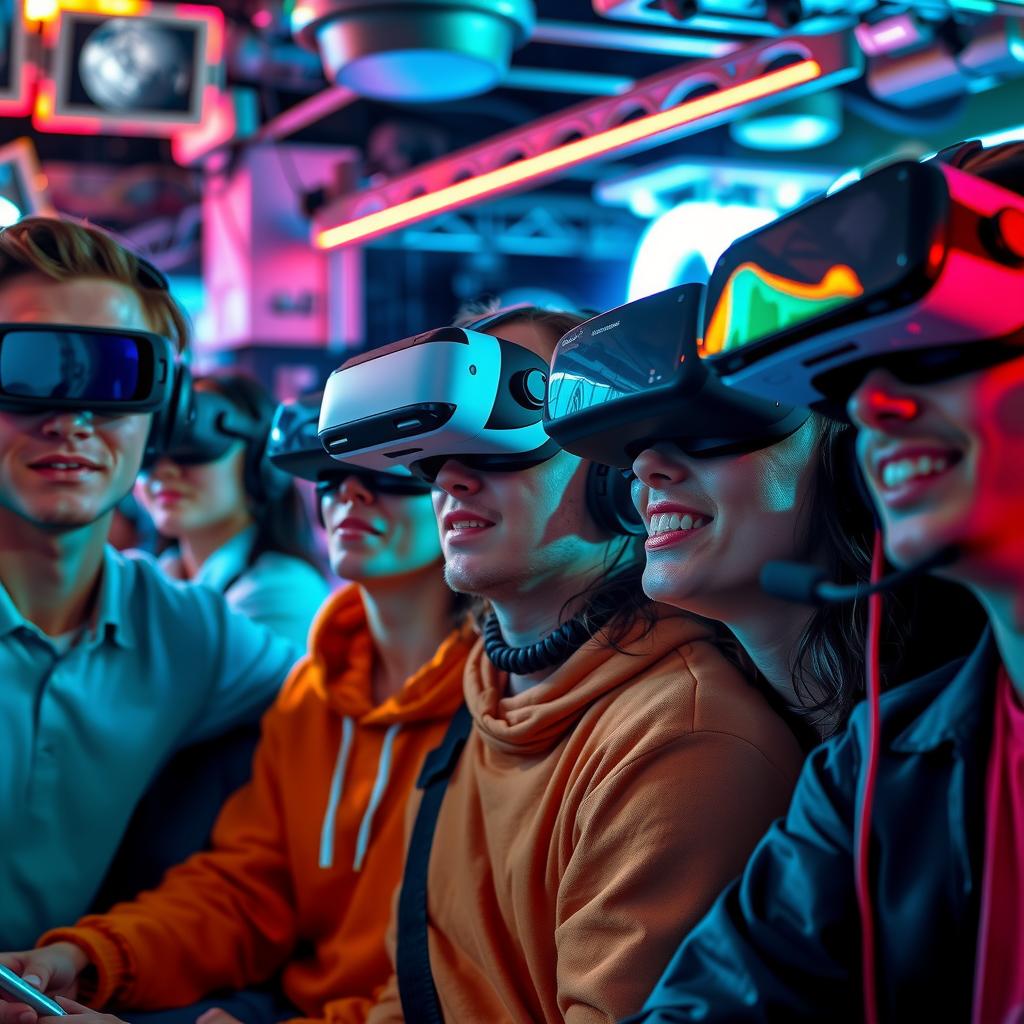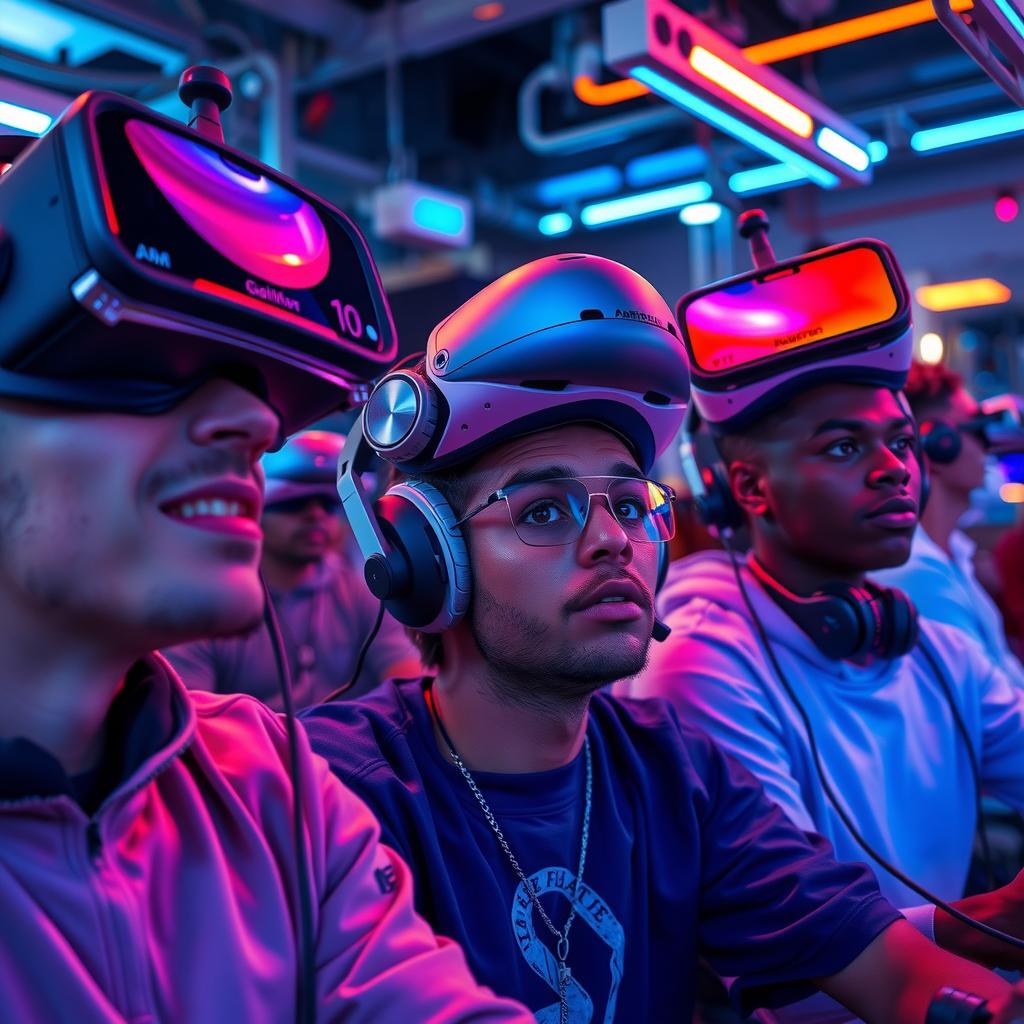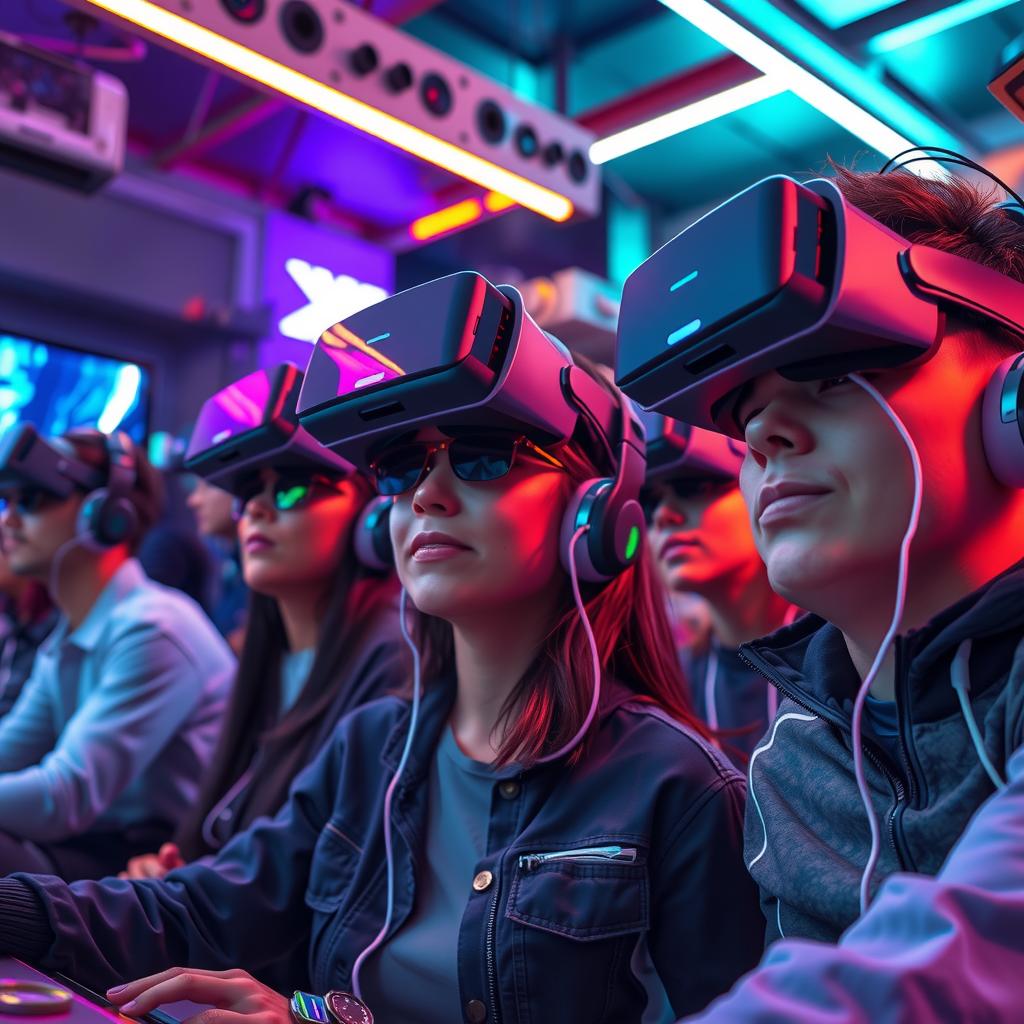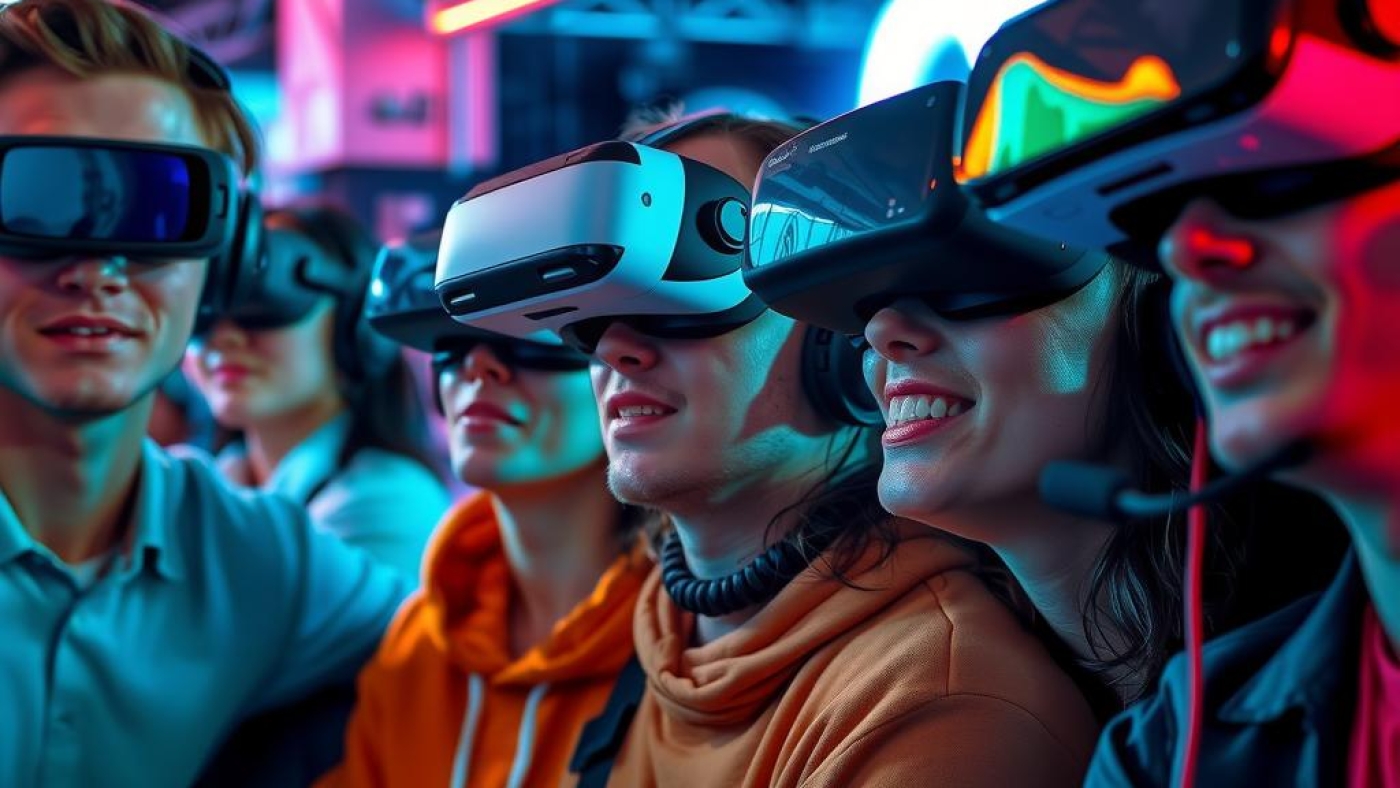In the ever-evolving landscape of gaming, Virtual Reality Gaming stands out as a transformative force that extends far beyond mere entertainment. As technology advances, VR gaming evolution has ushered in a new era characterized by unprecedented levels of immersion and interactivity. The latest hardware developments have played a pivotal role in enhancing user experience in VR, allowing players to engage with virtual worlds like never before. From sophisticated headsets to advanced motion tracking systems, these innovations not only elevate gameplay but also redefine how individuals perceive and interact within digital environments.
The impact of Virtual Reality Gaming on game design is profound, pushing developers to rethink traditional mechanics and narratives. Innovative gameplay mechanics are emerging that leverage the unique capabilities of immersive technology in gaming. This shift encourages creators to craft experiences that prioritize player agency and emotional connection—elements that are often overlooked in conventional formats. Furthermore, social VR experiences enable users to collaborate or compete with friends across distances, fostering community engagement in ways that were previously unimaginable.
As this medium continues its trajectory towards mainstream acceptance, future gaming trends suggest an even broader application for Virtual Reality Gaming beyond typical leisure activities. Educational institutions are beginning to harness the potential of VR for training simulations and interactive learning modules; healthcare professionals employ virtual reality experiences for therapeutic purposes; while industries explore its use for skill development through gamified training environments. Such applications illustrate how deeply integrated Virtual Reality Gaming can become within various sectors.
Ultimately, as we delve into the multifaceted realm of Virtual Reality Gaming, it becomes evident that this innovative form of entertainment serves as more than just a recreational pastime—it is reshaping interactions across countless domains while setting the stage for future advancements in immersive technology within gaming landscapes. By examining these dimensions further, one gains insight into how user experience in VR will continue evolving alongside technological breakthroughs and cultural shifts driving our collective understanding of what games can achieve.

Key Points:
-
Title of the key point: The Evolution of Virtual Reality Gaming Hardware
The progression of Virtual Reality Gaming has been significantly influenced by advancements in hardware developments. Recent innovations have led to more sophisticated headsets, improved motion tracking systems, and enhanced sensory feedback mechanisms. These technological upgrades not only enhance the immersive experience but also ensure that users can engage with a wider range of applications in educational and therapeutic settings. As hardware continues to advance, it is expected that the user experience in VR will become even more intuitive and engaging. -
Title of the key point: Innovative Gameplay Mechanics in Virtual Reality Gaming
Innovative gameplay mechanics are reshaping how individuals interact within Virtual Reality Gaming environments. By incorporating elements such as adaptive narratives and interactive challenges, developers have created unique experiences that facilitate learning through engagement. This approach allows educators to leverage immersive technology in gaming for various pedagogical strategies while also offering therapeutic benefits for individuals seeking mental health support. The impact on game design is profound, as these new mechanics encourage collaboration among players, fostering community through social VR experiences. -
Title of the key point: Future Trends Influencing Virtual Reality Gaming Experiences
As Virtual Reality Gaming continues to evolve, future gaming trends will play a crucial role in shaping its trajectory across education and therapy sectors. Emerging technologies such as artificial intelligence and augmented reality are expected to merge with VR platforms, creating richer virtual environments tailored for specific learning outcomes or therapeutic interventions. Understanding these trends helps stakeholders recognize how they can utilize VR gaming evolution effectively—transforming both educational paradigms and treatment methodologies while enhancing overall user experience in VR contexts.

The Educational Revolution of Virtual Reality Gaming
Harnessing Immersive Experiences for Enhanced Learning
The integration of Virtual Reality Gaming in educational settings is reshaping the landscape of learning by creating engaging environments that foster deeper understanding and retention. Unlike traditional methods, which often rely on passive information absorption, immersive technology in gaming allows students to actively participate in their learning journey. This active engagement leads to improved retention rates as learners interact with content in dynamic ways. For instance, when students explore historical sites through VR experiences, they are not merely reading about events; they are experiencing them firsthand, which significantly enhances recall and comprehension.
Moreover, the evolution of VR gaming has been marked by hardware developments that make these experiences more accessible and user-friendly. Advances such as lighter headsets and better motion tracking have made it easier for educators to incorporate Virtual Reality Gaming into their curricula without requiring extensive technical knowledge or resources. Innovative gameplay mechanics further enhance this experience by allowing users to solve problems collaboratively within a virtual space—an aspect particularly beneficial for subjects like science and mathematics where experimentation plays a crucial role.
Social VR experiences also contribute positively to collaborative learning environments. Students can engage with peers from diverse backgrounds while participating in virtual simulations or group projects set within an interactive framework. Such interactions not only build social skills but also encourage empathy among learners as they navigate scenarios that require perspective-taking—a vital component of holistic education.
As the impact on game design continues to grow alongside advancements in technology, educational institutions are beginning to recognize the potential benefits offered by Virtual Reality Gaming beyond entertainment alone. These applications help cultivate critical thinking skills as students face real-world challenges within controlled environments where mistakes lead to valuable lessons rather than failure. The future gaming trends indicate an upward trajectory toward integrating more complex narratives and gamified elements into education systems.
In conclusion, harnessing immersive experiences through Virtual Reality Gaming presents an unparalleled opportunity for educators aiming to enrich their teaching methodologies while catering effectively to various learning styles. By embracing these transformative tools now available thanks to continuous innovation within the field—educators can create vibrant classrooms brimming with possibilities that extend far beyond conventional limits.

Therapeutic Applications of Virtual Reality Gaming
Transforming Mental Health Treatment with Immersive Technology
The integration of Virtual Reality Gaming into therapeutic practices has marked a significant revolution in the treatment of mental health issues such as anxiety, PTSD, and rehabilitation. By leveraging immersive technology, therapists can create controlled environments where patients confront their fears and practice coping strategies without the real-world consequences that traditional methods might entail. For instance, exposure therapy—often used for individuals struggling with phobias or trauma—benefits immensely from VR’s ability to simulate realistic scenarios in a safe space. Patients can navigate virtual environments designed to evoke specific triggers while being guided by healthcare professionals who provide support and interventions as needed.
Furthermore, advancements in VR gaming evolution have led to more sophisticated hardware developments that enhance user experience in VR. The latest headsets offer high-resolution displays and motion tracking capabilities that make virtual experiences remarkably lifelike. This level of immersion is crucial for therapeutic applications; it allows users to engage fully with their environment and fosters emotional responses similar to those they would encounter in real life. Innovative gameplay mechanics are now tailored specifically for therapeutic goals—for example, games designed around breathing exercises or mindfulness techniques encourage players not only to relax but also actively develop skills essential for managing their mental health challenges.
Social VR experiences have further expanded the horizons of therapy by allowing individuals facing similar challenges to interact within these immersive spaces. Group sessions conducted in virtual environments foster community support among participants who may feel isolated due to their conditions. Such interactions can mitigate feelings of loneliness often associated with anxiety or depression while promoting collaboration through shared activities within the game world.
The impact on game design is profound; developers are increasingly incorporating elements aimed at improving mental well-being into virtual reality experiences. As user feedback shapes future gaming trends, there emerges an opportunity not just for entertainment but also genuine healing through innovative designs focused on psychological benefits rather than merely escapism.
As research continues validating the effectiveness of these approaches, it becomes evident that Virtual Reality Gaming stands at the forefront of modern psychological treatments—a tool capable of reshaping how practitioners address complex mental health issues through engaging yet effective means grounded deeply in empathy and understanding.
Innovations Driving Virtual Reality Gaming Forward
Exploring the Next Frontier of Educational and Therapeutic Applications
As technology advances at an unprecedented pace, the realm of Virtual Reality Gaming is poised for significant enhancements that could reshape its applications in education and therapy. The evolution of VR gaming hardware, such as lighter headsets with higher resolutions and improved tracking capabilities, has opened new avenues for immersive experiences. These developments allow learners to engage with educational content in ways that were previously unimaginable; for instance, students can now explore complex scientific concepts through interactive simulations or travel back in time to witness historical events firsthand. Moreover, innovative gameplay mechanics are being designed specifically to cater to therapeutic needs, enabling users to confront phobias or practice social skills within safe virtual environments. This intersection of advanced hardware and specialized game design not only enriches the user experience in VR but also tailors it towards specific learning outcomes or therapeutic goals.
Social Interactions Redefined Through VR
Enhancing Collaborative Learning Environments
The future trends in Virtual Reality Gaming prominently feature the rise of social VR experiences that encourage collaborative learning among users across geographical boundaries. As platforms evolve to support multi-user interactions within immersive environments, individuals can work together on projects or participate in shared training sessions regardless of their physical location. This paradigm shifts traditional educational models by fostering teamwork and communication skills while promoting a sense of community among participants. Additionally, educators can leverage these social aspects by designing group tasks where learners must solve problems collectively using critical thinking—transforming how knowledge is acquired and retained. Such innovations not only enhance engagement but also prepare students for real-world scenarios where collaboration is key.
Impact on Therapeutic Practices
Shaping New Approaches To Mental Health Treatment
In therapeutic settings, advancements in Virtual Reality Gaming are revolutionizing mental health treatment methodologies by providing controlled yet flexible environments tailored to patient needs. Emerging technologies enable therapists to create personalized interventions that simulate anxiety-inducing situations gradually—a process known as exposure therapy—allowing patients to confront fears safely under professional guidance. By integrating biofeedback mechanisms into these virtual experiences, practitioners gain insights into their clients’ physiological responses during sessions; this data-driven approach enhances treatment effectiveness while offering immediate adjustments based on real-time feedback from users’ emotional states. As research continues into the efficacy of these methods, it becomes clear that the role of immersive technology will expand significantly within psychological practices.
Future Game Design Considerations
Crafting Engaging Experiences for Diverse Audiences
Looking ahead at future gaming trends reveals an emphasis on creating inclusive content within Virtual Reality Gaming, ensuring accessibility for all potential users—including those with disabilities or varying levels of technological familiarity. Developers are increasingly prioritizing adaptive gameplay mechanics that accommodate diverse player abilities without compromising the richness of virtual reality experiences offered therein; this includes customizable controls and visual/audio aids enhancing immersion without alienating segments like neurodiverse players or those requiring assistive technologies. Furthermore, ethical considerations surrounding user safety and privacy will become central themes shaping game design philosophies moving forward; developers must navigate these challenges carefully while maximizing enjoyment through compelling narratives intertwined with meaningful interactions.
Advancements In User Experience Design
Fostering Greater Engagement Within Virtual Realms
As competition intensifies across sectors utilizing Virtual Reality Gaming, a focus on superior user experience becomes paramount when looking toward innovations on the horizon within this field—all aimed at elevating overall satisfaction rates among gamers seeking engaging entertainment options alongside educational benefits derived from targeted applications delivered via immersive technology interfaces themselves! Enhanced sensory feedback systems promise greater realism than ever before: haptic suits simulating touch sensations elevate involvement levels beyond current expectations! Coupled with artificial intelligence-powered NPCs (non-player characters) adapting dynamically based upon players’ actions? It’s evident why many foresee an explosion regarding interest surrounding both casual gamers & serious learners alike embracing what awaits them ahead!
The Virtual Reality Gaming landscape has undergone significant evolution over the years, driven by rapid advancements in hardware developments. This evolution has allowed for more immersive technology in gaming, enhancing user experience in VR and enabling a broader range of applications within educational and therapeutic settings. High-fidelity graphics, motion tracking, and haptic feedback have transformed traditional gameplay into engaging virtual reality experiences that promote active learning and emotional healing. As a result, educators can utilize these tools to create interactive lessons that foster critical thinking while therapists can leverage them to provide safe environments for patients confronting anxiety or phobias.
Innovative gameplay mechanics have also played a crucial role in the transformative power of Virtual Reality Gaming. By integrating elements such as adaptive difficulty levels and collaborative challenges within social VR experiences, game developers are reshaping how users interact with content. These innovations not only enhance game design but also improve user engagement through personalized experiences that cater to individual learning styles or therapeutic needs. Educational institutions are beginning to recognize the potential of these mechanics for teaching complex subjects, while therapists find value in their ability to simulate real-world scenarios where patients can practice coping strategies.
Looking ahead at future gaming trends reveals an exciting trajectory for Virtual Reality Gaming, especially concerning its implications for education and therapy. The ongoing development of cross-platform capabilities will likely increase accessibility for users across various devices, democratizing access to immersive technology in gaming environments. Additionally, advancements in artificial intelligence may further personalize user interactions within VR games—tailoring educational content or therapeutic exercises based on real-time feedback about progress or stress levels. As these technologies converge with established practices in education and mental health treatment, the impact on both fields could be profound.
Common Inquiries:
Q: How does Virtual Reality Gaming benefit education?
A: Virtual Reality Gaming enhances education by creating immersive learning environments that engage students actively through interactive simulations tailored to various subjects.
Q: What role do innovative gameplay mechanics play in therapy?
A: Innovative gameplay mechanics allow therapists using Virtual Reality Gaming platforms to develop personalized treatment plans that adapt based on patient responses during sessions.
Q: Are there any downsides associated with using Virtual Reality Gaming for therapy?
A: While there are many benefits from using Virtual Reality Gaming, potential downsides include issues related to accessibility costs and possible discomfort due to prolonged use of headsets among some individuals.

Leave A Comment